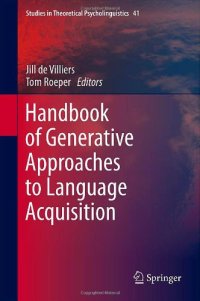
Ebook: Handbook of Generative Approaches to Language Acquisition
- Genre: Linguistics // Linguistics
- Tags: Psycholinguistics, Language Education, Syntax
- Series: Studies in Theoretical Psycholinguistics 41
- Year: 2011
- Publisher: Springer Netherlands
- Edition: 1
- Language: English
- pdf
Modern linguistic theory has been based on the promise of explaining how language acquisition can occur so rapidly with such subtlety, and with both surprising uniformity and diversity across languages. This handbook provides a summary and assessment of how far that promise has been fulfilled, exploring core concepts in acquisition theory, including notions of the initial state, parameters, triggering theory, the role of competition and frequency, and many others, across a variety of syntactic topics that have formed the central domains of investigation and debate. These topics are treated from the unique perspective of central actors in each domain who have helped shape the research agenda. The authors have presented a summary of the data, the theories under discussion, and their own best assessments of where each domain stands. Providing as well the agenda for future work in the field showing both particular needs and general directions that should be pursued in the coming decades.
Modern linguistic theory has been based on the promise of explaining how language acquisition can occur so rapidly with such subtlety, and with both surprising uniformity and diversity across languages. This handbook provides a summary and assessment of how far that promise has been fulfilled, exploring core concepts in acquisition theory, including notions of the initial state, parameters, triggering theory, the role of competition and frequency, and many others, across a variety of syntactic topics that have formed the central domains of investigation and debate. These topics are treated from the unique perspective of central actors in each domain who have helped shape the research agenda. The authors have presented a summary of the data, the theories under discussion, and their own best assessments of where each domain stands. Providing as well the agenda for future work in the field showing both particular needs and general directions that should be pursued in the coming decades.